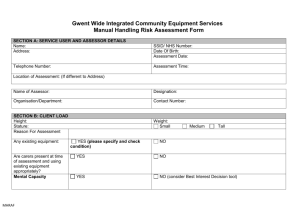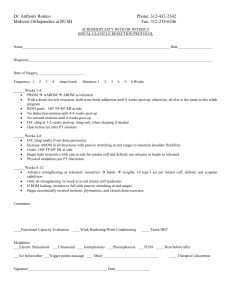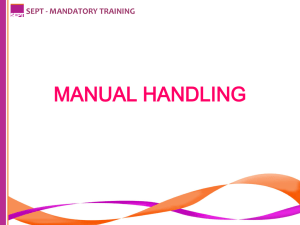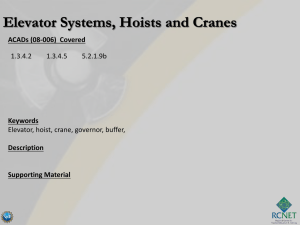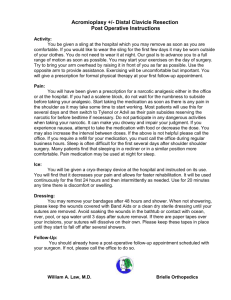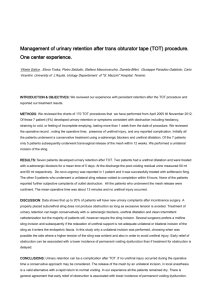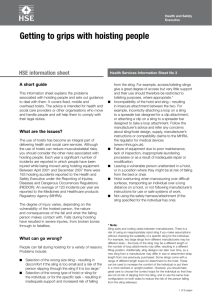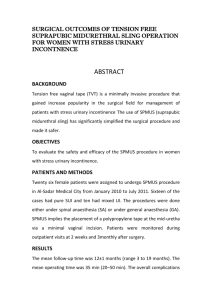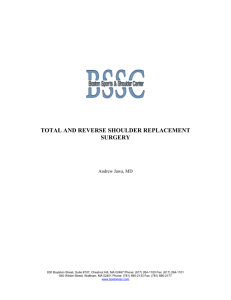Non Matching Hoist and Sling Checklist
advertisement
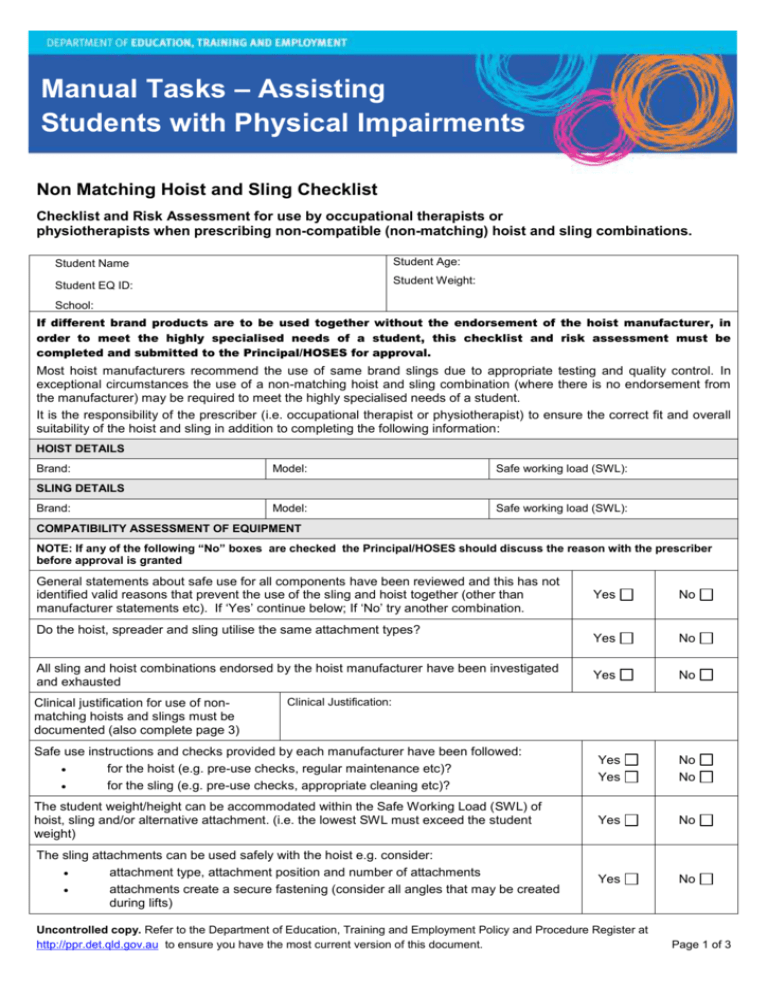
Manual Tasks – Assisting Students with Physical Impairments Non Matching Hoist and Sling Checklist Checklist and Risk Assessment for use by occupational therapists or physiotherapists when prescribing non-compatible (non-matching) hoist and sling combinations. Student Name Student Age: Student EQ ID: Student Weight: School: If different brand products are to be used together without the endorsement of the hoist manufacturer, in order to meet the highly specialised needs of a student, this checklist and risk assessment must be completed and submitted to the Principal/HOSES for approval. Most hoist manufacturers recommend the use of same brand slings due to appropriate testing and quality control. In exceptional circumstances the use of a non-matching hoist and sling combination (where there is no endorsement from the manufacturer) may be required to meet the highly specialised needs of a student. It is the responsibility of the prescriber (i.e. occupational therapist or physiotherapist) to ensure the correct fit and overall suitability of the hoist and sling in addition to completing the following information: HOIST DETAILS Brand: Model: Safe working load (SWL): Model: Safe working load (SWL): SLING DETAILS Brand: COMPATIBILITY ASSESSMENT OF EQUIPMENT NOTE: If any of the following “No” boxes are checked the Principal/HOSES should discuss the reason with the prescriber before approval is granted General statements about safe use for all components have been reviewed and this has not identified valid reasons that prevent the use of the sling and hoist together (other than manufacturer statements etc). If ‘Yes’ continue below; If ‘No’ try another combination. Do the hoist, spreader and sling utilise the same attachment types? All sling and hoist combinations endorsed by the hoist manufacturer have been investigated and exhausted Clinical justification for use of nonmatching hoists and slings must be documented (also complete page 3) Yes No Yes No Yes No Clinical Justification: Safe use instructions and checks provided by each manufacturer have been followed: for the hoist (e.g. pre-use checks, regular maintenance etc)? for the sling (e.g. pre-use checks, appropriate cleaning etc)? Yes Yes No No The student weight/height can be accommodated within the Safe Working Load (SWL) of hoist, sling and/or alternative attachment. (i.e. the lowest SWL must exceed the student weight) Yes No The sling attachments can be used safely with the hoist e.g. consider: attachment type, attachment position and number of attachments attachments create a secure fastening (consider all angles that may be created during lifts) Yes No Uncontrolled copy. Refer to the Department of Education, Training and Employment Policy and Procedure Register at http://ppr.det.qld.gov.au to ensure you have the most current version of this document. Page 1 of 3 The use of the sling and hoist together do not create angles or distortion that may cause instability of the hoist or loss of lifting power of the hoist Yes No The prescribed sling has been functionally assessed and the safety and comfort of the student and staff are maintained e.g. consider: student position when raised and lowered in all lift situations leg/feet positioning, head positioning re-spreader student can be appropriately positioned and balanced in all lift situations clearance over furniture etc is achieved nip, crush or other entrapment points are not created during lifts Yes No Appropriate training can be provided to staff using the sling with the hoist for the individual student. Yes No A Manual Handling of Students Risk Assessment has been completed and is attached. Yes No PRESCRIBER DETAILS Name: Position/Profession: Location (Department of Education, Training and Employment [DETE] Staff): Employer (non-DETE): Date: Signature: HOSES ENDORSEMENT - ENSURE PAGE 3 IS ALSO COMPLETED I confirm that this hoist/sling combination has been recommended in order to meet the highly specialised needs of the student only. Signature: Supported/ Not Supported Date: Comments PRINCIPAL APPROVAL FOR TRIAL - ENSURE PAGE 3 IS ALSO COMPLETED I confirm that this hoist/sling combination has been recommended in order to meet the highly specialised needs of the student only. I approve a trial of the hoist/sling combination. Signature: Trial Approved/ Not Approved Date: Comments: Success of trial of hoist/sling combination: PRINCIPAL APPROVAL - TRIAL COMPLETED I confirm that this hoist/sling combination has been recommended in order to meet the highly specialised needs of the student only. A trial has been conducted. Signature: Approved/ Not Approved Date: Comments Uncontrolled copy. Refer to the Department of Education, Training and Employment Policy and Procedure Register at http://ppr.det.qld.gov.au to ensure you have the most current version of this document. Page 2 of 3 Risk Assessment Complete this page to provide a comparison between the matching sling and the prescribed (non-matching ) sling. The risks listed should be derived from the clinical justification for the recommended sling. It should be demonstrated that the risk levels and outcomes for student (and/or staff) are improved by using the prescribed sling as compared with the manufacturer endorsed sling Risk Manufacturer endorsed (matching) sling List identified risks that are improved by using the prescribed sling – e.g. inadvertent detachment, student fall, student positioning, student response. Likelihood Consequence Risk level Prescribed (non matching) sling Likelihood Consequence Risk level Risk Matrix Table Insignificant Minor Consequence Moderate Major Critical No treatment required Minor injury – first aid treatment Injury - medical treatment or lost time Serious injury e.g. lost time Loss of life or multiple serious injuries Medium Medium High Extreme Extreme Likely Low Medium High High Extreme Possible Low Medium High High High Unlikely Low Low Medium Medium High Rare Low Low Low Low Medium Almost Certain Likelihood Uncontrolled copy. Refer to the Department of Education, Training and Employment Policy and Procedure Register at http://ppr.det.qld.gov.au to ensure you have the most current version of this document. Page 3 of 3
